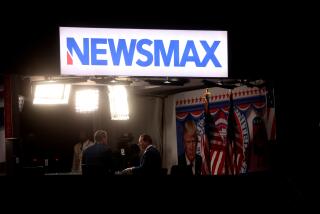Wall Street Wary of DirecTV Purchase
- Share via
Wall Street gave News Corp. Chairman Rupert Murdoch’s planned acquisition of DirecTV an unequivocal thumbs-down Thursday, punishing the stock prices of the Australian-based media company and its U.S.-based entertainment subsidiary.
In a move announced after the market closed Wednesday, News Corp. agreed to pay $6.6 billion in stock and cash for a 34% stake of the El Segundo-based parent of DirecTV, Hughes Electronics Corp. The purchase, which must be approved by federal antitrust regulators, would give Murdoch virtual control of the satellite TV leader and the nation’s second-largest pay-TV provider.
Analysts and investors applauded the strategic wisdom of the deal, which would fill the last major hole in News Corp.’s global satellite TV empire and giveit leverage with the major media conglomerates.
But they were disappointed in the price and the structure.
Some News Corp. investors say the 22% premium over Hughes’ current market value would be too high a price for Murdoch to pay considering that he was the lone bidder after other suitors fell out of the race this month.
Some shareholders of News Corp.’s publicly traded entertainment subsidiary, Fox Entertainment Group Inc., are unhappy that they would be financing the acquisition. Murdoch had previously indicated that the parent company would most likely shoulder the burden.
As part of the deal, News Corp. would transfer its 34% stake in Hughes to Fox, which would take on $4.5 billion in debt to pay for the purchase. Analysts are concerned that the debt’s annual interest payments of an estimated $225 million would weaken Fox’s balance sheet and reduce its earnings. Investors immediately showed their disappointment with that structure. News Corp.’s U.S. traded shares dropped $1.77 a share Thursday to $25.45 on the New York Stock Exchange. Fox shares were off even more sharply, down 17%, or $4.65, to $22.60.
Several analysts downgraded their ratings on Fox, even though Fox over the last year has reported better earnings and stock growth than its rivals, including highly prized Viacom Inc.
Fox, 80% owned by News Corp., has enjoyed revenue strength at its television stations, film division and cable channels such as Fox News, which in that period overtook CNN as the cable news leader.
“It becomes appropriate to question the valuation at which Fox should now trade relative to its peer group,” said Jessica Reif Cohen of Merrill Lynch in a report on the deal. “Given management’s comfort level with using Fox as a financing vehicle for acquisitions at News Corp., we believe that Fox’s valuation should reflect this concern.”
Hughes shareholders also voiced their objections. They worry that because News Corp. plans to use stock to pay for about half of the 34% stake, declines in News Corp.’s shares between now and the time the deal is completed could reduce the value to Hughes shareholders, as well as to Hughes’ parent, General Motors Corp.
Hughes shares tumbled, closing at $10.36, down $1.12, or nearly 10% -- despite the $14 a share News Corp. agreed to pay.
News Corp. officials said Thursday that the premium was necessary to satisfy the demands of GM, which it says threatened to hold on to Hughes rather than sell to Murdoch if it didn’t get $15 a share.
While the auto giant needs cash to pay off deficits in its pension fund, the timing isn’t the best: Hughes’ value has dropped in half since GM first put it up for sale in 2000, as subscriber growth slowed at DirecTV and the economy slipped.
Some Hughes shareholders also were disgruntled that the deal would give them about $1 a share less than GM.
GM agreed to sell its 20% interest in Hughes to News Corp. for the same price that other shareholders are getting, but it also would receive a special $275-million payment for giving up control.
In a news conference late Wednesday, Murdoch said the decision to place Hughes shares within Fox was logical.
“It belongs there. Fox was created to house News Corp.’s American content and distribution assets,” he said.
But analysts also said News Corp.’s balance sheet could not absorb the additional $4.5 billion of debt on its own.
Some News Corp. shareholders embraced the deal, pointing out that it was cheaper than the company’s failed bid in 2001.
“They had to pay up to get the deal done,” said Jim Lyon, a managing principal at Oaktree Capital Management, which owns News Corp. shares. “They would have had to pay something like $25 billion in stock and cash 2 1/2 years ago.”
Lyon views the acquisition as smart because it gives News Corp. the leverage it needs to play in a league with bigger media companies such as AOL Time Warner Inc., Viacom and Walt Disney Co. However, he acknowledged the challenges facing DirecTV, Hughes’ primary asset.
“They need to generate a profit,” said Lyon, whose firm sold its stake in Viacom to buy News Corp. shares. “But they stand a better chance of doing that under News Corp. than Hughes and GM management.”
More to Read
The biggest entertainment stories
Get our big stories about Hollywood, film, television, music, arts, culture and more right in your inbox as soon as they publish.
You may occasionally receive promotional content from the Los Angeles Times.










